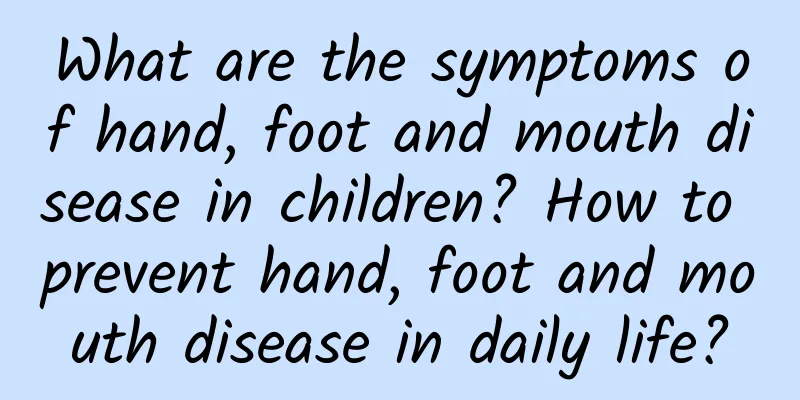Briefly describe the causes of diarrhea in children

|
The causes of pediatric diarrhea mainly include infection, food intolerance, improper feeding and allergies, and targeted measures need to be taken according to the specific cause. Infection is the most common cause, such as viruses, bacteria or parasites; inappropriate diet, hereditary intestinal diseases or environmental factors can also cause diarrhea. 1. Infectious factors Infection is the leading cause of diarrhea in children, among which viral diarrhea is very common, especially rotavirus and norovirus infections. Bacteria such as Salmonella and Shigella can also cause acute diarrhea, while parasitic infections such as amebiasis usually occur in environments with poor sanitary conditions. If a child has diarrhea accompanied by fever, vomiting, or blood in the stool, he or she should seek medical attention as soon as possible. In the case of viral diarrhea, oral rehydration salts are taken according to the symptoms to prevent dehydration. For severe bacterial or parasitic infections, antibiotics or antiparasitic drugs may need to be used under the guidance of a doctor. 2. Diet and feeding factors The digestive system of children is not fully developed yet. When complementary foods are added or milk powder is changed inappropriately, it is easy to cause indigestion and diarrhea. For example, the introduction of high-protein foods too early may increase the burden on the gastrointestinal tract, and the wrong proportion of milk powder or overfeeding can also cause gastrointestinal discomfort. For these situations, the child's diet and feeding method should be adjusted. It is recommended to follow the doctor's or nutritionist's advice to gradually change food or milk products, while avoiding too much sweets or processed foods. 3. Food intolerance and allergies Some children may be intolerant or allergic to milk, lactose or certain foods, leading to diarrhea. Lactose intolerance is a common condition, where children cannot digest lactose, leading to bloating and diarrhea. For children with lactose intolerance, lactose-free formula milk or non-dairy milk powder can be chosen. If it is caused by other food allergies, such as eggs, nuts or seafood, you need to avoid contact with related foods through dietary elimination. 4. Environmental and genetic factors Drinking contaminated water, unclean food or bacterial contamination in the living environment can increase the risk of diarrhea in children. Certain congenital genetic diseases, such as celiac disease or congenital glucose metabolism disorders, may also cause recurrent diarrhea. For environmental factors, the risk of disease can be reduced by improving sanitary conditions, regularly disinfecting toys and tableware, and ensuring safe drinking water. For genetic diseases, long-term management and dietary planning should be carried out under the guidance of a doctor. There may be many reasons for diarrhea in children. Parents need to carefully observe the symptoms and choose countermeasures according to the specific situation. If the child has frequent diarrhea, fever or dehydration, they should seek medical attention immediately to avoid serious consequences. The key to preventing diarrhea in children is to maintain good hygiene habits, feed properly and pay close attention to changes in the child's health. |
<<: How to treat polio at the age of 18
>>: What causes jaundice in babies?
Recommend
Can massage cure patent ductus arteriosus?
Patent ductus arteriosus is a common disease in t...
What is the most serious hazard of Kawasaki disease?
Many parents lack a correct understanding of thei...
Diagnosis points and differential diagnosis of diarrhea in children
The main points for diagnosing diarrhea in childr...
What should we pay attention to in preventing pneumonia in children
What parents are most worried about is their chil...
What are the causes of hernia in children?
The main cause of hernia in children is incomplet...
What causes Kawasaki disease in children?
Kawasaki disease in children is mainly caused by ...
Which department should I go to for examination of ADHD in children?
Children with ADHD need to be examined by pediatr...
How long does it take to cure diarrhea in children?
Pediatric diarrhea is the second most common dise...
How long does it take to cure Kawasaki disease?
How long does it take to cure Kawasaki disease? M...
What should I do if my newborn baby has pathological jaundice? 4 ways to prevent pathological jaundice
Neonatal jaundice is divided into physiological a...
Is 13.5 jaundice on 14 days considered high?
Jaundice is more common in the neonatal period. J...
What are the common symptoms of acute laryngitis in children?
What are the common symptoms of acute laryngitis ...
Which hospital is safe for jaundice treatment?
Children will have jaundice within a few days aft...
A brief description of nursing records for Kawasaki disease
Many parents are not particularly familiar with K...
What to do if a newborn has jaundice
What should I do if my newborn has jaundice? Once...









